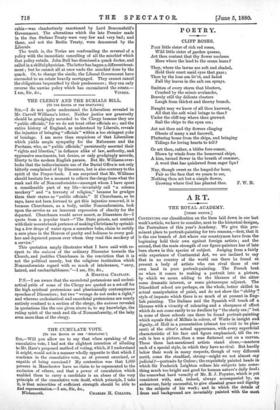THE CLERGY AND THE BURIALS BILL. [TO THE Exuma OP
THE SPECTATOR-) Sra,—I do not quite understand the Liberalism revealed in Mr. Carvell Williams's letter. Neither justice nor generosity should be grudgingly accorded to the Clergy because they are "public officials," for we do not treat other officials so ; and the entire history of England, as understood by Liberals, reveals the injustice of bringing" officials" within a too stringent yoke of bondage. I am more than suspicions of that Liberalism which yields ample sympathy for the Reformers and the Puritans, who, as "public officials," persistently asserted their "rights and liberties," in defiance alike of law, authority, and oppressive enactments, but denies, or only grudgingly accords, liberty to the modern English parson. But Mr. Williams over- looks that the indiscriminate use of the Burial Office is not only bitterly complained of by Dissenters, but is also contrary to the spirit of the Prayer-book. I am surprised that Mr. Williams should hesitate for a moment to relieve the clergy from what the rank and file of Nonconformists—amongst whom I have spent a considerable part of my life—invariably call "a solemn mockery" and "a travesty of religion," because he grudges them their status as "public officials." If Churchmen, as he says, have not been forward to get this injustice removed, it is because Churchmen, as a body, unlike Nonconformists, look upon the service as an innocent expression of charity for the departed. Churchmen would never assert, as Dissenters do—I quote from a popular tract—" The State priests, not content with their mountebank pretence of making Christians by sprinkl- ing a few drops of water upon a senseless babe, claim to certify a sure place in the Heaven of purity and holiness to every god- less and depraved person over whom they read this mockery of a service."
This quotation amply illustrates what I have said with re- spect to the animus of the ordinary Dissenter towards the Church, and justifies Churchmen in the conviction that it is not the political merely, but the religions institution which Nonconformists regard with so much of intolerance, "envy, hatred, and uncharitableness."—I am, Sir, &c., A 110SPITAL CHAPLAIN.
P.S.—I am aware that the sacerdotal pretensions and ecclesi- astical pride of some of the Clergy are quoted as a set-off for the high spiritual pretensions and pharisaically contemptuous speeches of Dissenters ; but two "wrongs do not make a right," and whereas ecclesiastical and sacerdotal pretensions are nearly entirely confined to a section of the clergy, the animus revealed in quotations like the one given above is, to my knowledge, the ruling spirit of the rank and file of Nonconformity, of the laity even more than of the clergy.


































 Previous page
Previous page